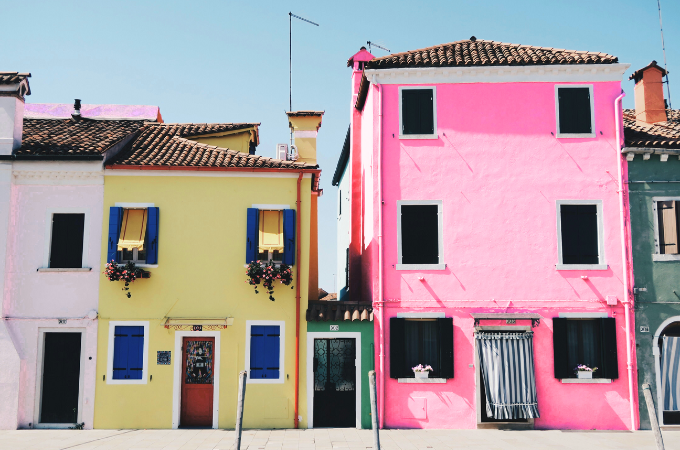
My mother’s house is a concrete structure several blocks from the sprawling Accra markets that threaten to bleed onto this very block. It’s a narrow house with three stories that require one to be fully ambulatory which my mother is not. At the back of the top floor, there is a splendid view of the Atlantic Ocean. This floor was my father’s study before he moved out and replaced my mother with a younger woman. He allowed my mother to keep the house because by then he had amassed a considerable amount of money from engineering patents, and he wanted to start fresh. Those were the words that he used.
My mother’s house is painted a soft pink, more of a salmon, and it blends in perfectly with the sunset. My mother rarely leaves the house due to her advanced age of eighty-three and the fact that she is no longer the first wife. She believes she has lost a certain amount of status in the friendship circle she once called her second family, but she maintains a special place in my father’s traditional heart because she is the only wife that gave him heirs. His new wife cannot bear children, a fact that saddens my father greatly because Miriam is quite stunning, but she is also Westernly thin. My mother suspects that carrying children would be difficult if not impossible for her. She even warned my father, but he was so taken with the mysterious Liberian refugee, her words fell on deaf ears, as they say.
I am one of the heirs. I have two sisters; the older one, Olga, is in America. My father viewed her marriage to an American as her farewell to Africa. They don’t speak much. My father attended college and graduate school in Sweden, so he was heavily influenced in the naming of children, hence my younger sister, Elsa. She is in London working on a PhD in Economics at the age of fifty-five. Bravo to her. I’m Ebba, the middle child. My name means strong as a boar, and maybe that’s why my mother called me several weeks ago and now employs me as her butler. My father did not inform my older sister, Olga, that he had found a new wife, and he didn’t want to bother my younger sister Elsa with the news because he wanted her to stay focussed on her degree. He said he told me because I had space in my head to consider his situation unbiased. Perhaps this is the plight of the middle child. At any rate, I had no PhD to focus on, and I had been living, or camping according to my mother, in Lesotho transporting medicines to remote villages on horseback. This was one of many jobs that I’ve held in my lifetime. Most of my jobs are not related. They are a collection of disparate positions I took for one reason or another. Mostly, I’m not a practical person and never think about my future though it happens each new day.
The second floor of my mother’s house contains a kitchen and two small bedrooms. One of the rooms is where Old Patsy, the servant, sleeps. She is responsible for my mother’s meals, daily bathing and massage. All other household tasks fall on my strong as a boar shoulders. The main floor is where my mother lives and will eventually die. From her vantage point, she can see the boat builders carving their traditional fishing rigs, and the women mending nets. I often find her standing in front of the sliding glass windows holding onto the cane that supports her as she moves slowly and heavily throughout her ground floor quarters. “Ebba!” My mother must call out my name loudly even when I am easily within view. You see, from where she lies on a daybed in her living area, she has a clear view of the kitchen though it is the next floor up. “I need some more mead wine,” she says, and off I go, as if I’m trying out for a role in Remains of the Day. She knows this means a trip to the market for me. I’ve learned to feign irritation because then she will have me run there several times in one day. In reality, I love any excuse to leave the stifling confines that she calls her cave.
As I said, the market is close by, and I take the slow winding route thus turning a ten minute trip into twenty-five minutes. I loiter in the fish market taking in the exotic catch of the day. There’s a seller called Fatima who does a UK impression of fish and chips, and she sells out every day. She often wears a cowboy hat worn by so many in Lesotho, so we struck up a quick friendship. I see her and wave. She waves back, but we can’t talk now; there’s a long queue at her stall, and she’s dishing up the hot fried cod she serves with her own African chips made from her homegrown russet potatoes. The mead wine is in a small stall just beyond the fragrant flower stalls. I love to walk slowly past these colorful explosions of flower collections as they remind me of my lunch breaks in the mountains of Lesotho. Just around a bend, and I’d be gifted with a patch of orange crimson flags and fields of pink and purple. I do miss that – the solitary work I did. It was meaningful in its own way.
The mead stall. Amon, a small man from Egypt who doesn’t like to talk or even make eye contact, hands me a bottle of mead. My mother craves this special blend imported from Ethiopia and claims that she feels better after one glass. Amon offers me a surreptitious smile, and I hand him a $10 bill which he quickly tucks away in his large sewed-on pockets on his canvas kaftan. “Your mother is well?” It’s difficult to hear a soft-spoken person in this cacophony of loud dialects – mostly the Ga of Accra – but many Fanti and Ashanti voices can be heard haggling for what they want.
“Yes, she is still with us,” I reply and leave because I know that it is not comfortable for him to speak with a non-muslim woman who wears her hair short and natural and is unmarried at fifty-seven. Gray has taken over my head. I’m middle-aged and have no shame about my changing appearance. As in Lesotho, I wear a poncho over a tunic with jeans and cowboy boots. My days there were on horseback in a rugged country that wasn’t always safe. I leave the market area and go home the fast way because my mother is impatient.
“Why have you never wanted a normal life?” She is splayed out on the daybed, and this is what I am greeted with when I walk through her door.
“Here’s your wine, mom.”
“Answer my question, Ebba. Patsy thinks you’re a very troubled woman.” Patsy is in the kitchen staring down at me from the top of the stairs. She is bursting with laughter. I have always liked Patsy, and I’ve known her all my life.
“Can I get you anything else?”
“Sit down and talk to me. I have no guests these days. Everyone’s just waiting for me to die. My neighbor across the street wants this house.” I never really know what to say to my mother’s comments. She delivers them in an off-handed way, but later I’ll learn that they were significant statements, and why wasn’t I paying attention. I’m feeling tested and wondering why I didn’t stay in America like Olga did.
“You’re too quiet, Ebba. Say something, child with gray hair.” Laughter from the kitchen makes me smile. Patsy loves to laugh at my struggle but not in an evil way. What can I say to her at this point in our relationship? She’s old, and I’m no longer a child. My lesbianism is offensive to her – a strange disease I caught in America. Can’t I shake it off? Life for a woman without a husband seems absurd to her traditional mind. I go upstairs, and my mother stares at the TV screen because she has forgotten me already and moved on to something more exciting, more entertaining, more meaningful. This has been our entire existence. But she saw me when I deviated from the norm.
The room I have been assigned is across the hall from Patsy’s on the second floor. It is generic with only a bed and a chair. I won’t miss anything when I leave, so it allows for a pleasant kind of detachment. On a trip home after several months in Lesotho, I burned everything I owned including my diplomas, clothes, and trinkets from foreign travels. Why did I do it? My father turned up on the very night I stood out back and set fire to my pile. His visit was unexpected, so instead of the solemn ritual I had envisioned, I got my mother’s distress from the surprise arrival of my father who sat and moaned about his new wife. But why did I do it? My father came outside as the bonfire obliterated my stuff into ash and asked me what the meaning of it was. I told him that most of the people I brought medicine and supplies to died, and when they died, their relatives either claimed their possessions quickly and quietly or pondered over what to do with them while they camped out in a tent next to the house. I decided that it was best to carry as little as possible in life. In that way, no relatives had to face decisions about how to handle the remains of my life. There would simply be nothing left. My father, of course, thought I was taking a moral stance about owning things and subtly judging him since he lived a lavish lifestyle. He threw his hands up and left in a huff. I was reliving that memory and smiling to myself when my phone rang.
It was my sister Elsa. “Guess who I ran into the other day in Finsbury Park?”
“I can’t guess. Tell me,” I say.
“Come on. Try.” Elsa has never changed. Whether she is five or fifty-five, this girl wants you to work for everything. It’s the challenge she loves.
“Winston Churchill?”
“No. Very funny. Ebba, come on!”
“Margaret Thatcher?”
“Stop with the dead people already.”
“I give up, and I have tried.”
“Tetzi Boateng.”
“Seriously?”
“Yeah. She’s headed home because she doesn’t want to have a nervous breakdown in London.”
“Why is she having a nervous breakdown?”
“I don’t know, but I gave her your number. I hope that’s okay. I know you were close friends at school.”
When we hung up, I thought about Tetzi. We were close in high school, but then I went to college in America, and she had to help run her father’s taxi business in Accra. We fell out of touch, but what a friend she had been. She taught me how to drive a stick shift and how to change a tire. She was the first friend I had who was openly lesbian and unashamed. I don’t know how she came to have such confidence, but she wore a suit and tie at her brother’s wedding, and no one attempted to throw her out. She was unconventional in every way. I fell asleep that night hoping to hear from Tetzi.
“You should color your hair. You’ll look younger. The younger you look the better you feel,” my mother said as I held her feet and used some large shears to clip her nails. It was morning, and I could smell the fresh-brewed coffee that Patsy made while she listened to an aggressive Baptist minister on her radio in the kitchen. “You know, Ebba, life does not have to be one long trudge towards the great beyond.” My mother has big eyes, and she likes to pop them wide to make a point. She popped them at me and waited.
“Thanks for the second wife wisdom,” I said – a cruel jab, but I couldn’t take it back once the words had escaped my mouth.
“Second wife! Second wife!” she sucked her teeth and pulled her feet away. “Demon child, leave my presence! Cruel demon child!” Patsy laughed from above, and I walked up the stairs to the kitchen to grab a cup of coffee. Just as I sat down ready to sip, she called out to me. “Ebba! I need you to get me stamps.” The post office was a mile away. This was my punishment, I suppose. I accepted it,
Just as I was leaving the Dansoman Post Office, I smelled coffee again for the second time and decided to grab a cup at the Coffee Call inside Tetegu Bus Stop. The morning was cold and windy, a typical August in Ghana. I sat down at the counter with my steaming Americano as travelers disembarked from a bus originating from Kumasi. Of course, that brought back memories from boarding school and my old friend Tetzi Boateng who somehow bumped into Elsa in London. Forty years had passed since we sat on the roadside sucking milk through a straw in a coconut and contemplating our future lives under an unforgiving African sun. The walk back home was one long recollection of my high school days and lots of laughing with Tetzi. I returned to the house with stamps and envelopes and found my aging mother asleep – head thrown back and mouth open wide – in her favorite recliner. I waved a quick hello to Patsy and walked out the backdoor on the main floor. The ocean breeze washed over me, and I savored the sea scent. How long would I have to stay here as my mother’s butler?
As I entered the tiny room where I slept, I did wonder what exactly had happened to my life. Have I ever felt passionate about anything? Was I guarding my soul so closely that I forgot to allow passion inside? A memory of me on a new red bike my father gave to me resurfaced. I rode down our old street in Accra whooping it up with pure joy. I whipped around the corner and slowed just enough to tear my shirt off. I was nine years old and strong as a boar. When I zoomed back to our narrow driveway chanting “Ebba Ebba,” my mother yanked me from the bike and beat me mercilessly for a crime I did not understand. “You are a girl, not a boy!” she repeated over and over as she slapped at me, but I already knew I was a girl. I was a girl with a beautiful red bike, and I knew how to ride fast. Had this punishment for an ancient transgression snuffed out my ability to seize the day? She saw me clearly so many years ago and beat me.
The clouds’ promise finally delivered, so I sat on my narrow bed listening to the heavy pinging of the rain on the metal rooftop. A nervous breakdown. Tetzi. Of course I understood. That’s why I accepted a job in faraway Lesotho – a place where I could just exist within the emptiness I felt. I arrived at the job site a month early so I could find a small, beautiful place to cry in. I rented a tiny house overlooking a field of wildflowers, and I spent that first month familiarizing myself with the inside of my heart. I cried for days, pausing only to eat and take short walks. Thinking back to that time now, maybe it was all about passion and the lack of it. I burrowed into my self-imposed loneliness until the calendar announced my start day. When work began, I started the new job with a hollowness that I feared would be with me for the rest of my life. The work of ferrying medical supplies was quiet and all-consuming, and the land that I traveled over slowly began to fill me with a sense of purpose that I knew I needed.
“Ebba, come downstairs and keep me company!” It was only eight in the evening, so I joined my mother and sat down on the couch while she watched one of her favorite soap operas. She smiled and turned up the volume, foreclosing any conversation. I looked at her as she laughed at the screen, and I wondered what I would do with myself when she finally passed away.
“This is so funny. I love this program. Don’t you?”
“No, mom, I don’t.”



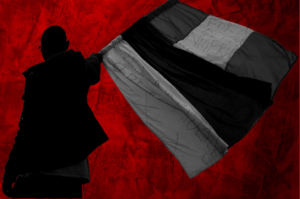
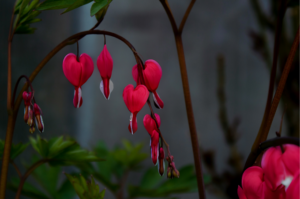
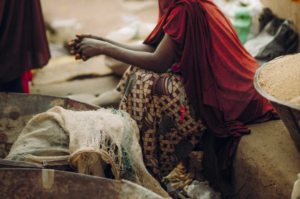
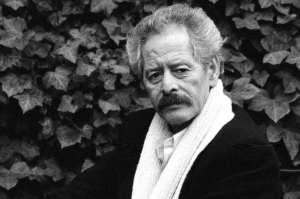
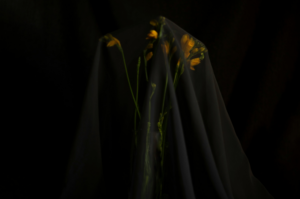


COMMENTS -
Reader Interactions